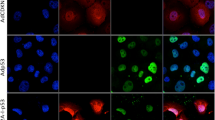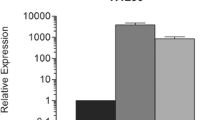Abstract
To assess the role played by p16 gene expression in the radiosensitivity of human lung cancers, we transferred exogenous p16 genes into p16-deficient H460 and A549 lung adenocarcinoma cell lines and compared the cell survival curve in vitro after irradiation. The surviving fraction of the p16-transfected A549p16 and H460p16 cells that expressed exogenous p16 mRNA or protein was lower than those of the parental and negative control cells. The rapid exit of the p16-transfected cells from the G2/M phase in the cell cycle, both before and after irradiation, possibly contributes to the increased radiosensitivity of our experimental p16-transfected lung adenocarcinoma cell lines. We conclude that exogenous p16 gene may be another important factor controlling the intrinsic cellular radiosensitivity of cancer.
Similar content being viewed by others
Author information
Authors and Affiliations
Additional information
Received: 6 February 1998 / Accepted: 4 August 1998
Rights and permissions
About this article
Cite this article
Fu, X., Zhang, S., Ran, R. et al. Restoration of the p16 gene is related to increased radiosensitivity of p16-deficient lung adenocarcinoma cell lines. J Cancer Res Clin Oncol 124, 621–626 (1998). https://doi.org/10.1007/s004320050224
Issue Date:
DOI: https://doi.org/10.1007/s004320050224




